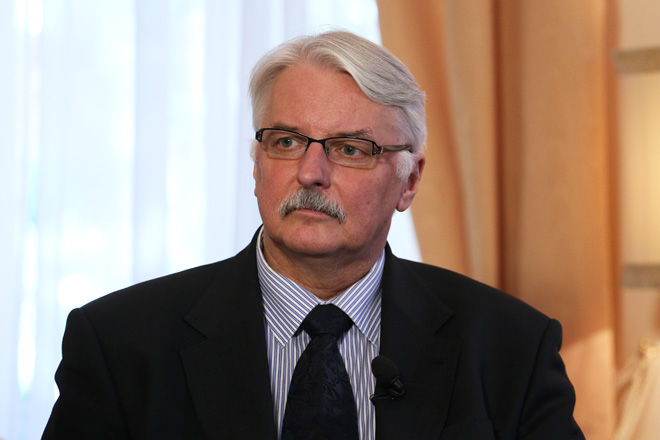Baku, Azerbaijan, June 14
By Dalga Khatinoglu - Trend:
Trend's interview with Polish Foreign Minister Witold Waszczykowski.
Q: Iranian media report that Tehran and Warsaw have signed MOUs worth $700 million during a recent visit of Iran's FM Mohammad Javad Zarif to Poland. What cooperation areas will be covered under those deals?
A: First of all, it should be noted that during the aforementioned visit some MOUs were signed, not contracts though; additionally a letter of intent was inked between the Polish Chamber of Commerce and the Iranian Chamber of Commerce, Industries, Mines and Agriculture.
It means that there is still a long way ahead for the Polish and Iranian partners before these preliminary in fact agreements are transformed into fully binding contracts.
In fact, during the visit only two MOUs were signed - in the field of energy production and maritime infrastructure - however their value has not been disclosed due to trade confidentiality clauses, but we can assume that the total value is not even close to $700 million; the figure should be measured in much humbler range.
Of course, taking into consideration the potential of Polish and Iranian economies, there is a perspective for reaching such values in bilateral trade in the future. Of course, in order to achieve this, much more time is needed.
We should also remember the strong competition from international companies, mainly from other EU member states, Ukraine, Russia, Japan and South Korea among others, which are also interested in doing business with Iran.
Q: When the MOUs are expected to become operational? Have the banking problems been settled between the two countries?
A: Given Poland's successful story in adopting an effective model of free market economy with a major share of market consisting of private, small and medium enterprises, it only depends on management boards of the companies how their businesses are run and their new markets defined.
Polish government has no leverage in this regard. As the Polish FM, responsible among other things for strengthening commercial ties with foreign countries, I can only hope that these MOUs will become operational soon.
As to the banking issues, based on Joint Comprehensive Plan of Action and SWIFT's decision on reopening operations for Iranian banks, there are now no legal barriers for money transfers between the EU and Iranian banks.
Polish banks were quite active in that field, and two Polish banks restored their ties with three major Iranian private-owned banks this March. Also during the business forum that took place during Iranian Foreign Minister Mohammad Javad Zarif's visit to Warsaw, a session on banking issues was held with the participation of a number of Polish and Iranian banks.
Q: Polish deputy energy minister earlier said the two countries are negotiating over oil and gas cooperation. In which areas, the Polish oil and gas firms, including PGNiG, can cooperate with Iran?
A: Due to the scope of activities and financial capabilities of Polish oil and gas companies we do not aim at full-scale competition with major global players in terms of big investment contracts, which are a priority for the Iranian Ministry of Petroleum, but still there is a big field of cooperation in the framework of some smaller contracts, mainly in services sector: geophysical assessment and exploration, drilling, on-surface infrastructure construction and maintenance.
PGNiG's sister companies have significant experience in executing such international contracts and for sure Iran could be their partner. The talks are ongoing and we are optimistic about their progress.
Q: Does Poland plan to buy crude oil from Tehran?
A: Diversification of supplies, looking for new sources and suppliers, as well as channels of delivery of the crude oil and natural gas are matters of strategic importance for Poland.
As the market of hydrocarbons and political situation worldwide change rapidly, Polish experts, also in the Ministry of Foreign Affairs, assess feasibility of cooperation with various countries, not excluding any of them.
When it comes to Iran, taking into consideration the opinion of Iranian Ministry of Petroleum, there is no surplus of crude oil that would enable Iran to enter new markets.
Should investments in Iranian oil and gas sector be made according to the plans of Iranian administration, Iran would achieve significant export capabilities. Most likely, traditional pre-sanctions crude oil buyers from the EU, like France, Italy, Spain, Greece, will renew their contracts with Tehran, so we do not exclude that Poland also joins that group.






